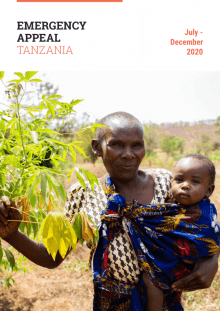Attachments
-
 Download report (PDF | 1.99 MB)
Download report (PDF | 1.99 MB)
Overview of the Crisis
COVID-19 was declared a global pandemic on 11 March 2020, and Tanzania registered its first case on 16 March. As of 8 May, when the last update was published, the country had recorded 509 cases and 21 deaths. Following the country’s first reported case, a 30-day ban was imposed on public gatherings (except for worship), and schools were closed. On 17 April 2020, the Government extended the school closure indefinitely. Zanzibar banned all tourist flights from entering the region and authorities in Kigoma Region advised refugees to stay inside the camps. Tanzania then suspended all international commercial flights on 12 April. However, on 14 May, some flight restrictions were lifted for repatriations, humanitarian aid, medical and relief flights and other safety-related operations, and on 18 May the passenger flight suspension to and from Tanzania was also lifted. Tanzania has maintained open land borders throughout the COVID-19 outbreak.
The global economic shock and disruption from COVID-19 will negatively affect the most vulnerable in Tanzania, increasing needs across the country. Tanzania’s gross domestic product (GDP) was US$57.4 billion in 2018, making it the third largest economy in East Africa, and its growth was projected to remain stable at about 6 per cent in 2020. However, transport, trade and tourism are key components of Tanzania’s economy, and could be seriously impacted by the COVID-19 pandemic. Tourism accounts directly for 4.2 percent of Tanzania’s GDP, or an estimated $2.44 billion in 2018. The sector generates the bulk of the country’s exports, exceeding both mining and energy, and directly employs over 400,000 people.
Tanzania shares eight land borders and is a key transport hub for landlocked countries in the region, including Malawi, Zambia, Democratic Republic of Congo (DRC), Burundi, Rwanda and Uganda. With countries in the region responding to the immediate threat of the pandemic, border closures and road transport disruptions have been increasing. Kenya and Zambia recently closed their borders with Tanzania for people movement but remain open for cargo movements. In recent weeks, there has been a rise in truck and transport operators testing positive for COVID-19 at border crossings in the region and the threat of increasing COVID-19 cases remains high.
Despite positive economic growth, inequality remains high and 26.4 per cent of people in Tanzania live below the national poverty line, making them vulnerable to global economic shocks caused by COVID-19. An estimated 4.3 million people are employed in the country’s informal economy which represents 22 per cent of total employment in Tanzania and are less protected through regulatory measures than the formal sector. Overall unemployment remains high, at 10.3 per cent on the mainland and 14.3 per cent on Zanzibar. The situation is most severe in urban centers, where 23.3 per cent of people are unemployed, compared to 7.5 per cent in rural areas. In Dar es Salaam, women are three times more likely to be unemployed than men. Only 4 per cent of older people in Tanzania receive a pension, leaving many to work into old age. As a result, while older people are more at risk of COVID-19, many poorer elderly people may be unable to self-quarantine as they seek an income for survival. Refugees – who already face movement restrictions and are reliant on humanitarian assistance – may also be impacted by the deteriorating economic situation.
Rapid population growth and urbanization have strained services in urban centers, where an estimated 8 million people (more than 50 per cent of the urban population) live in informal settlements, inadequate housing or crowded slums. These areas are densely populated, lack adequate water and sanitation facilities and are overcrowded, with families often sharing one or two rooms, making measures to combat COVID-19, including handwashing and social distancing, difficult to implement. Poverty, poor sanitation and pollution in informal settlements mean that residents often suffer from high rates of undiagnosed respiratory infections, including asthma and tuberculosis, which places older residents in informal settlements at higher risk during COVID-19. Many residents of informal settlements are unable to afford soap, water or basic household needs.
Across Tanzania, the healthcare system is stretched, including due to rapid population growth, making response to the pandemic a challenge. There is a shortage of between 50 and 70 per cent of qualified health workers and neonatal and maternal mortality remain high.6 An estimated 320 children die daily in Tanzania and only 63.7 per cent of births are delivered by skilled health personnel; 398 women will die during birth per 100,000 live births. People in Tanzania have to travel, on average, 8 kilometers to the nearest health facility, and patients that rely on regular treatment may be unable or unwilling to visit health facilities during the pandemic. There are over 1.6 million people in Tanzania living with HIV, including 92,000 children. Over 253,000 people have tuberculosis, 28 per cent of whom are also HIV positive. People living with HIV often face stigma and discrimination when accessing services and their access to anti-retroviral therapy (ARVs) may be compromised during the pandemic.
Access to safe water and ability to practice handwashing is critical to reduce exposure to COVID-19, yet only less than half (an estimated 47 per cent) of households in Tanzania have handwashing facilities with soap and water, and the proportion is even lower in Zanzibar (37 per cent). About 6 in 10 households have access to safe water, mostly in urban areas, and only 1 in 5 (19 per cent) used improved sanitation. Many health facilities lack adequate WASH facilities, with only 68 per cent having access to safe water and only 44 per cent having latrines for patients, increasing the health risks and potential for disease transmission.
- UN Office for the Coordination of Humanitarian Affairs
- To learn more about OCHA's activities, please visit https://www.unocha.org/.




